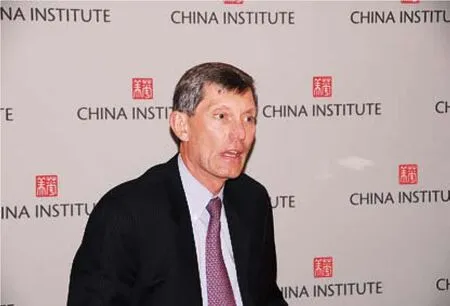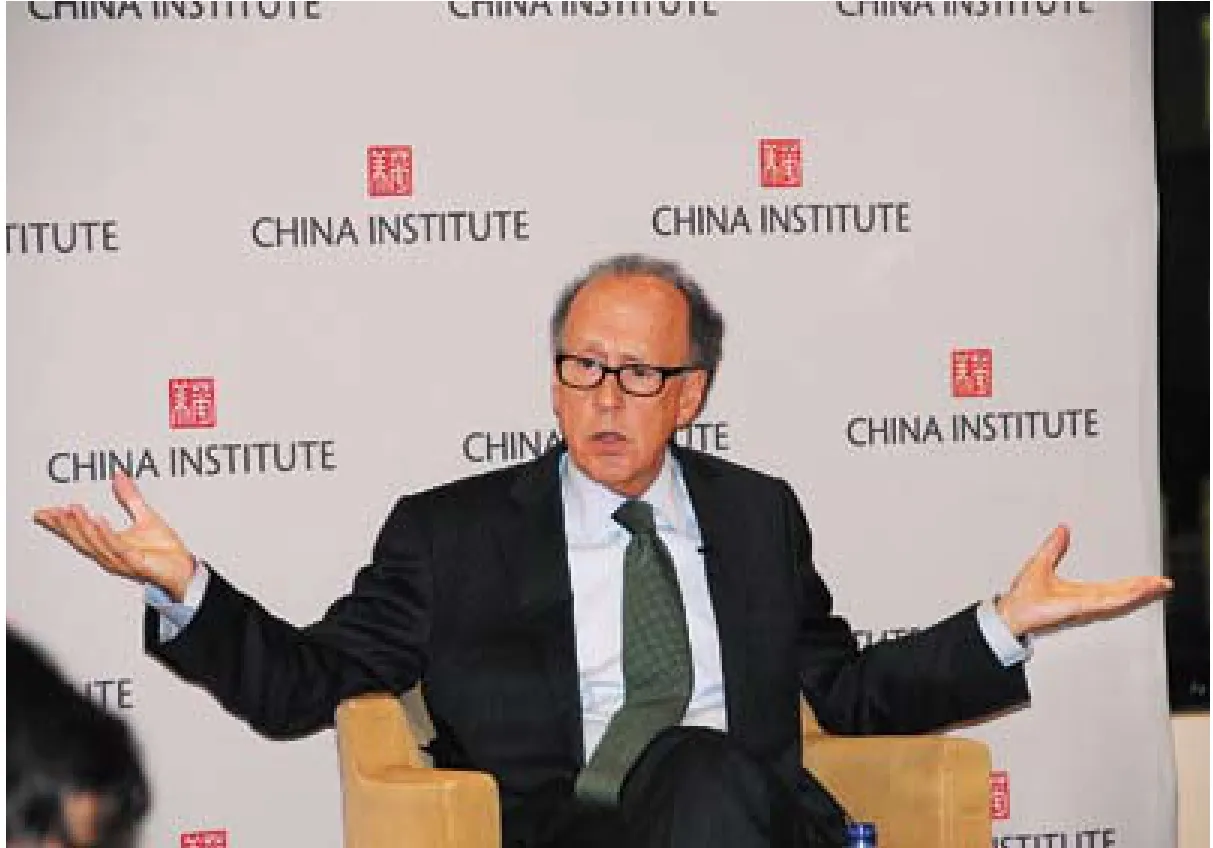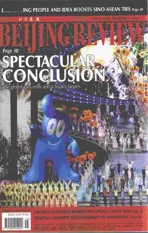Toward More Sustainable Economy
2010-10-14
Toward More Sustainable Economy
Currency, trade and capital markets were the main topics at this year’s annual Executive Summit held by the China Institute in New York City. Alongside the summit, Stephen Roach, Non-Executive Chairman of Morgan Stanley Asia and senior fellow of Yale University, and Steven Dunaway, adjunct senior fellow for International Economics, Council on Foreign Relations and former Deputy Director of the Asia and Pacifc Department of the IMF, shared their views on these three issues of current concern withBeijing Reviewreporter Chen Wen. Edited excerpts follow:
Attitude on growth
Stephen Roach: China defnitely needs to shift its growth model away from drawing support from exports and external demands and focus it more on the internal demands of the Chinese people. Now, there are a number of reasons China needs to do this.
For one thing, a better balanced economy is more sustainable. Second, it will also be very positive for China to reduce excess savings and current account surpluses that will alleviate pressure brought to China from the rest of the world. And third, which I think is most important, the external environment is going to be weak because of the crisis. China needs strong growth to absorb surplus labor to maintain social stability. If it continues to rely on foreign demand, it’s going to fnd itself in trouble.
So, for all of those reasons, China needs to shift the growth structure and it needs to do it quickly.
Steven Dunaway: The problem is political, because right now I think it’ll be very difficult to make tremendous amounts of progress with a change in leadership coming. Up to now, the Chinese growth model has been presumed to be very successful. But you can’t continue this model, because China is becoming too large.
The leadership has already recognized it. Premier Wen Jiabao in 2008 said implicitly that the economy is not sustainable. But the problem is with this transition, there is the tendency that any reforms would be implemented very slowly over the next three years. That’s a big problem, because the rest of the world is impatient and unwilling to wait for China to change.
China, for its own sake, should respond much quicker. The leadership believes they have time to make a gradual transition. But China had better take advantage of good economic conditions as soon as possible. When economic conditions are right, it’s the ideal time to take bolder steps.
Current accounts targets
Stephen Roach: China’s current account surplus is lower right now because of the state of the global economy and the business cycle. It’s likely to get larger over the next few years if no policy adjustments are made.
I am very much in favor of the new framework that seems to have been endorsed at the G20 fnance meeting in South Korea last month. It’s much more of a practical and workable framework than relying on currency adjustment, which I think is doomed to fail anyway.
But I don’t think we want to aim to get precise numerical targets. The goal here is for surplus savers like China to reduce their current account surpluses and to have policies on the path to continue to lead to further reductions over a sustained period of time. At the same time we want defcit savers like the United States to save more and reduce their current account defcits and set policies that will achieve that outcome. If we can do that, then we’re on a much more workable path for the global economy that will alleviate these massive imbalances.
Steven Dunaway: The current account target is a very bad idea. What’s important is policy changes that are directed at achieving higher sustainable growth. Those policy changes can be reflected in the current account.
I guess the proposal was that they can use the current account balance target as a shorthand indicator for whether or not the right policy has been put in place. But simply using the current account is a very bad indicator.
The G20 will be much better off if it continues to focus on policy change. If you focus on the current account, you’ll runthe risk that countries introduce additional distortion measures in order to hit the current account target, but you don’t solve long term issues.

Steven Dunaway, adjunct senior fellow for International Economics, Council on Foreign Relations
Currency adjustment
Stephen Roach: The U.S. House of Representatives recently passed a bill that could impose trade sanctions on China. After the mid-term elections, there is the possibility the U.S. Senate will pass a similar bill.
That will be a disaster, a horrible mistake. But that doesn’t mean it won’t happen.
Politics can move in strange ways. China is getting a strong signal where the recovery is weak, especially from the United States and Europe, that the world wants China to address global problems just like all countries that are participating in globalization. If China chooses not to move its currency, that’s China’s right. But if China does nothing on dealing with the other dimension of problem, such as surplus and saving, then it runs the risk of significant trade frictions and protectionist pressures not just from the United States but from other countries.
So China can’t afford a long debate. This 12th fve-year plan should contain very aggressive policies to stimulate internal private consumption.
Interest rate hike
Stephen Roach: China’s interest rate hike was just one move—it’s not clear if there’s going to be a series of additional moves.
If I had to take a guess right now, I don’t think there are going to be too many additional moves. But I think that because it was made shortly after an increase in the bank reserve requirements that these actions together aim more at dealing with the residential property bubble than dealing with pressures coming from the United States or any other foreign country.
Steven Dunaway: The increase was related to domestic consideration as opposed to external consideration. The hike made it clear that the government was not entirely happy with the situation concerning infation and that they were trying to cool things down. That is the main reason behind the hike.
It was also directed at the real estate market to let developers know that the government is still concerned about housing and property prices. But in particular, they’re more concerned of the consumption side, particularly food prices.
I don’t think there is going to be a series of moves to raise the interest rate. They’ll sit back and watch for a while. The key will be toward the end of this year or early next year when they announce the credit target. That’ll be the key indicator as to which way monetary policy will go.
Tackling inflation
Stephen Roach: The rate hike sent a strong signal that Chinese authorities are determined to prevent the property bubble from getting unmanageable. But I don’t think the rate hike itself is enough to stop it. If you combine the rate hike with the bank reserve requirement increase, it should put speculators on notice that there is more to come.
I look at the data week by week in terms of home sales from Chinese developers, and it looks like at least in the last couple of weeks activities have softened again. But really, it’s too soon to tell.
Steven Dunaway: I don’t think the hike will have much impact on curbing infation. The most effective tool that the central bank has is its credit policy.

Stephen Roach, Non-Executive Chairman of Morgan Stanley Asia and senior fellow of Yale University
Growth in the rest of the world is slow. Given relatively weak growth and world consumption, China may need to hold that credit target up in order to stimulate enough domestic activity.
The dilemma is this: In the next several years that they are not likely to get a big surge in exports as they had in the past to maintain rapid growth. So now the government has to decide how much money to put into the economy or what kind of spending will be needed to keep up the 8-9 percent (GDP) growth rate target.
Property bubble
Stephen Roach: This is and is going to be a problem.
Earlier this year, the government took action with a series of administrative measures. And it initially looked as if those top administrative measures in mid-April worked. But then over the summer, especially right after the National Day holiday (October 1-7), there was a strong resurgence in speculative activities.
If there’s something we’ve learned from the financial crisis, I hope it’s that excess speculative activities and excess bubbles can be very dangerous for the economy. China is right to turn more aggressive in terms of easing its policy to avoid the damage that might come from the bubble.
Steven Dunaway: They’ve been talking about property bubbles since the late 1980s. In some of the major cities, yes, there are conditions for bubbles. But at the end of the day, whether it will turn into a big problem or not all hinges on credit policy.
There is the risk that over the next three to fve years that China could end up with a signifcant bubble.
The ‘Chinese model’
Stephen Roach: China has had a unique approach to economic development that has been extremely successful over the past 30 years. This approach has stressed two key sectors: export and fixed-asset investment, which is maybe half driven by the export business itself; and internal private consumption.
Whether or not this is a model, or structural or economic approach, it’s a very unique, very powerful, very successful approach to economic development. But the point I’ve made and the point that I’m teaching in my course at Yale is that this approach is not a sustainable one. Premier Wen Jiabao himself has agreed, for most of the last three and a half years, in describing the Chinese approach as unstable, unbalanced, uncoordinated and ultimately unsustainable, so it gives you an idea of some of the things that need to be addressed to fnd a different approach that is more sustainable.
